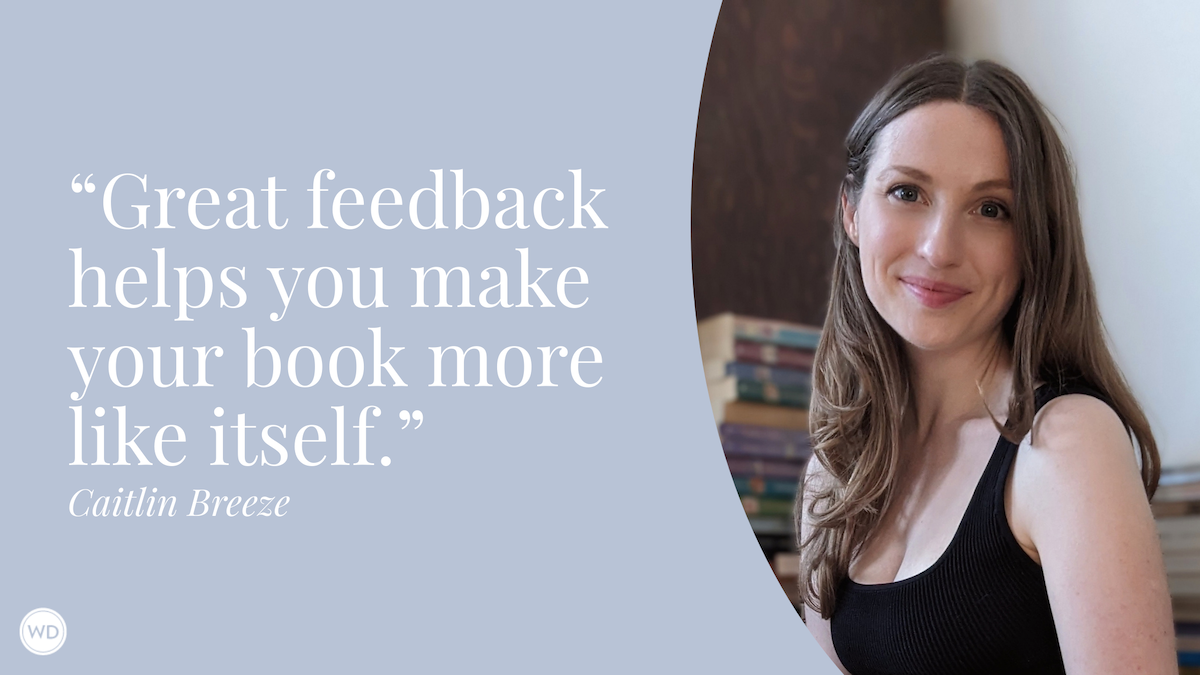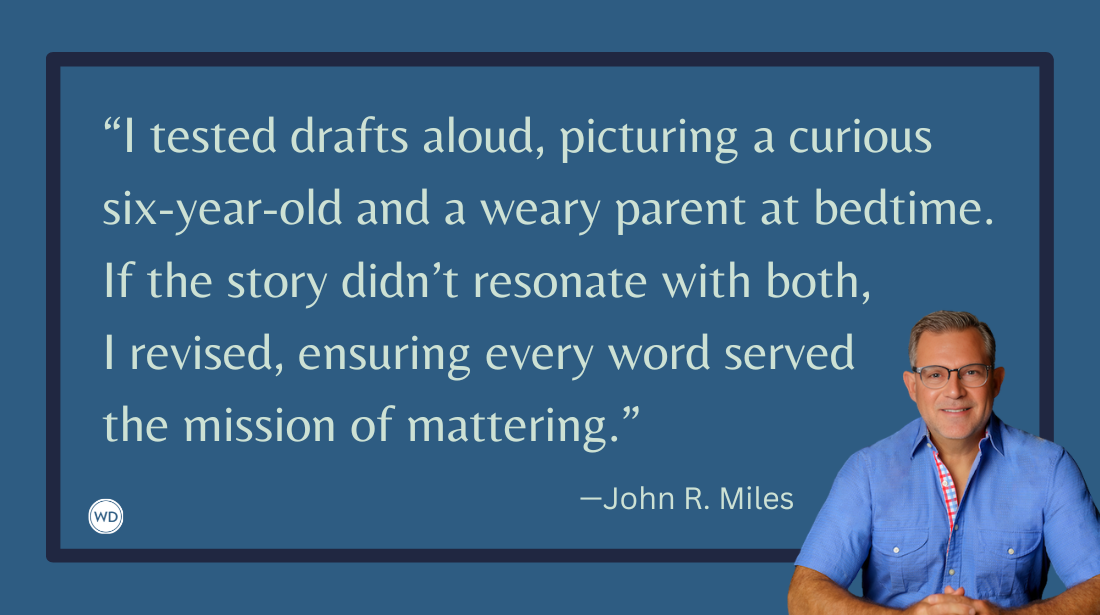Why Writers Should Hang Out With Shakespeare
Award-winning author Amy Miller shares what writers can learn from Shakespeare after more than a decade working as the publications manager at the Oregon Shakespeare Festival.
I’m a writer, but in my day job I work as the publications manager at the Oregon Shakespeare Festival (OSF), one of the largest regional theaters in the United States. I didn’t get the job because I’m a Shakespeare expert. Far from it—I come from a publishing background, and I’ve never even taken a drama class.
But even as a Shakespeare outsider, I’ve learned a lot about the Bard by hanging out with his plays during my 12 years at OSF—and I say “hanging out” because most of them are long. And I’ve come to appreciate his storytelling power and his influence on the English language we use every day.
And while I, of all people, understand that Shakespeare isn’t everybody’s cup of ale, there are aspects of his work that I think about all the time as a writer—things I take mental notes about while I’m watching Romeo and Juliet join hands at the party (did you know they only meet up four times while they’re—um—conscious?), or hearing the silence as a thousand audience members hold their breath during Macbeth’s achingly beautiful “tomorrow, and tomorrow, and tomorrow” speech.
Here are some of the Shakespeare things I think about there in the dark theater, things I now carry with me as a writer every day.
Your audience may be smarter than you think.
Shakespeare respected the intelligence of his audience; his plays are full of in-jokes and cultural references that 17th-century Londoners would have known all about, but they’re also full of long thoughts and elegant phrasing, writing that demands keen listening. And that close listening becomes even more important to a modern audience.
When I’m watching Shakespeare, I often feel like I’m at the dinner table with a group of people speaking German, a language I know fairly well but am not fluent in. So I understand maybe half of what I’m hearing—enough to get the gist—and my intuition has to fill in the rest.
Like rapidly spoken German is to me, Shakespeare is a river you enter that roars along, carrying you with it. You bang into some rocks sometimes, but it’s a journey. And the language is so beautiful that you might go home and look up the script to read that soliloquy that had you in tears, even though you didn’t get every reference.
These are all reminders that it’s OK to send your readers to Google or the dictionary while they’re reading your work. You don’t have to tell them everything, but you do have to make what you tell them delicious enough that they will want to know the rest.
His stories are always ripe for a reboot.
Shakespeare based most of his plays on older literary pieces, many of them well known at his time. And in turn, later writers have adapted Shakespeare’s plots to create new works of art—without Romeo and Juliet, there’s no West Side Story, and without King Lear, we wouldn’t have Jane Smiley’s A Thousand Acres.
The Taming of the Shrew and Kiss Me, Kate. The Tempest and Forbidden Planet. (Bonus points: Hamlet and Strange Brew.) All to say, there’s nothing wrong with hanging your writing magic on the scaffolding of an old tale.
And it’s not just Shakespeare. I can never get over how beautifully Louise Glück worked The Odyssey into her masterpiece of poems about divorce, Meadowlands. (Now I can’t read The Odyssey without thinking of Glück.)
Of course, you want to be careful with this in regard to copyright, but Shakespeare’s work, and Homer’s, is safely in the public domain. So pick an old tale and remold it—what will it become in your unique writing world?
It’s all about the language.
In Shakespeare’s case, I mean this literally. His scripts famously have few or no staging instructions or hints on how to deliver a line; there are no notes about “carrying a sword” or “wait a beat” or “dripping with irony.”
In his scripts, people just come onstage, say stuff, and leave; the actors and director have to figure out the rest. But the stuff they say is such language—much of it is actual rhyming poetry, with a distinct beat, and even the parts that aren’t verse are often very musical when spoken by an expert actor.
In one of my favorite Shakespeare memories, I got to take poet Tony Hoagland to a production of Shakespeare’s Troilus and Cressida one night in a theater so small that the actors were literally stepping on our feet. Tony was hard of hearing, so he rented a little headset for assisted listening—and at several points in the play he was absolutely rocking out with those headphones on, ecstatically bobbing his head and moving with the beat like he was listening to jazz.
I had never seen anyone do that, but Tony knew his Shakespeare and was dialed in to the rhythm of the lines. It made me see Shakespeare in a whole different way, and made me want to write so musically that the right reader, or listener, will experience a little musical ecstasy. (#goals)
Some of Shakespeare’s best lines come when people are talking to themselves.
Theatre experts will have a lot to say about this, but most of the modern plays I see are primarily dialogue: people talking to each other. There’s nothing wrong with that, but I can’t help noticing that some of Shakespeare’s best language comes in his famous soliloquies, when people are talking to themselves, mulling things over. As a modern writer, I fear some of those lines would get cut in a workshop today—“Wait, is he just standing there thinking?”
But without those self-talk moments—well, minutes, because the soliloquies are long sometimes—we’d be the poorer for it because we’d have no phrases like “sound and fury,” “slings and arrows,” “dagger of the mind,” or “a rose / by any other name would smell as sweet.” Shakespeare, in his time, had the freedom to let his characters think in front of the audience. Modern writers are urged to cut, cut, cut—get to the action, don’t bore the reader.
But it’s OK for writers to slow down a little, as long as the language is moving the story along, as the soliloquies do. As writers, of course we can use this in so many ways—it applies to interior dialogue in fiction, all of lyrical nonfiction (arguably), and a huge chunk of poetry.
Sometimes we just have to buck the criticism and let our characters (and ourselves) think on, growing the thoughts in our own wild way. And may we all coin a few immortal phrases while we’re at it.
Amy Miller’s Astronauts won the Chad Walsh Chapbook Prize from Beloit Poetry Journal and was a finalist for the Oregon Book Award, and her full-length poetry collection The Trouble with New England Girls won the Louis Award from Concrete Wolf Press. Her writing has appeared in Barrow Street, Copper Nickel, Gulf Coast, Narrative, Tupelo Quarterly, ZYZZYVA, and numerous anthologies. She received a 2021 Oregon Literary Fellowship in and lives in Ashland, Oregon.








